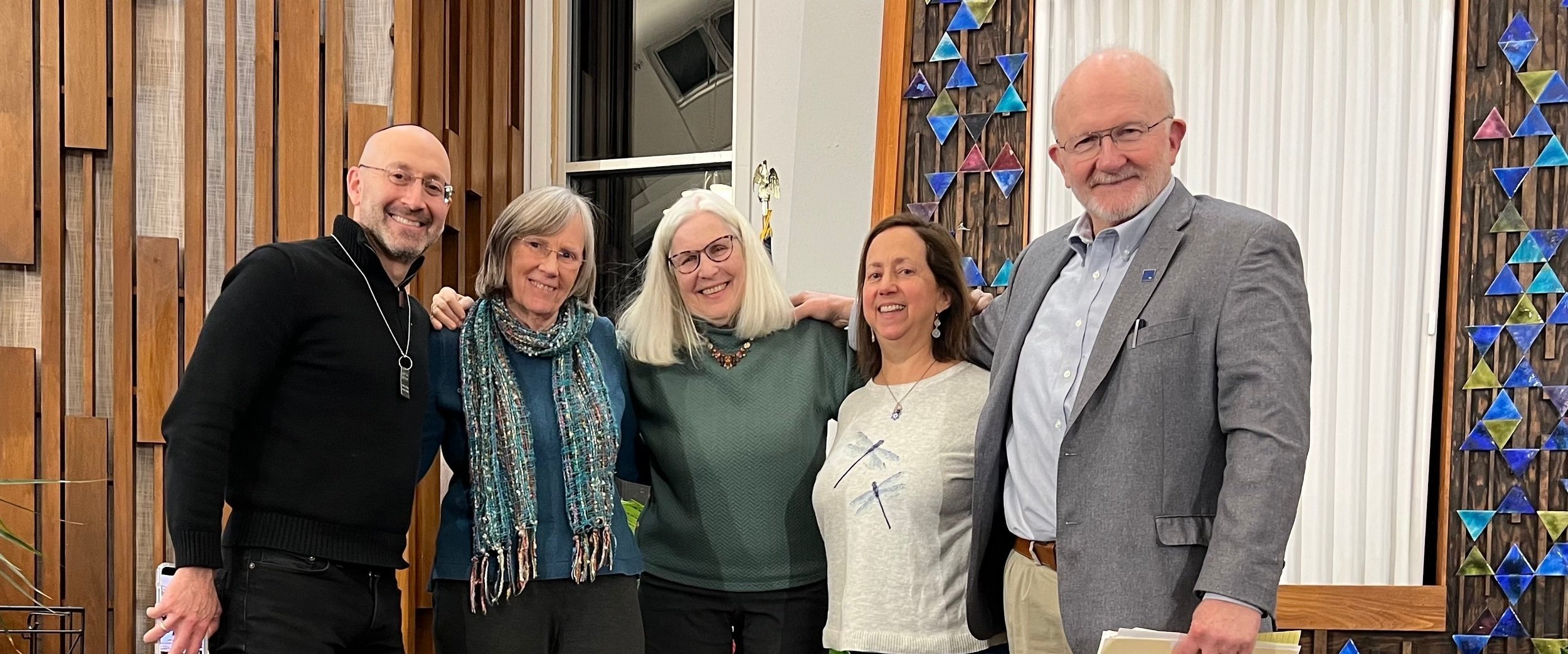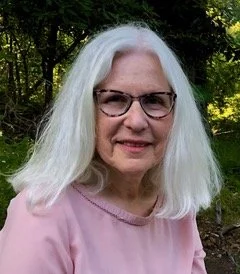What Is LUAA?
Lexington United Against Antisemitism (LUAA), an interfaith, cross-community grassroots organization, works to combat antisemitism, enhancing the sense of well-being and safety among our Jewish neighbors. An organization of over 200 members, we represent a broad array of religious, public, and private community entities and organizations, as well as unaffiliated individuals. Our efforts are concentrated in three main areas: community education, community action, and Christian reflection.
Designed by Ellie and Jack
Our Mission
Reducing antisemitism and deepening the sense of allyship among all Lexington residents
We work to increase knowledge of the origins, incidence and consequences of antisemitism; broaden the sense of solidarity with the Jewish community among those who are not Jewish; build allyship across all groups; and expand the capacity of all Lexingtonians to actively “stand-up” to antisemitic speech and actions.
We believe these efforts will amplify and extend ongoing local activities in Lexington to combat racism, anti-LGBTQ+ hatred, and other forms of religious, cultural, and social bigotry. We offer our work as a resource for other communities organizing themselves for these purposes.
Our Strategy
We use a variety of strategies to achieve our goals to educate broadly, to build community connections, to increase solidarity, and to audit Christian practices that inadvertently promote anti-Jewish sentiment.
Ways we do this…
We screened the documentary "Repairing the World" about the Tree of Life (Pittsburgh, PA) massacre and the Pittsburgh interfaith community’s response for a large community-wide audience at Lexington High School, followed by a panel discussion including a diverse group of LHS students and faculty.
We shared a meal and table conversation with over 70 participants across faith communities while also learning about contemporary antisemitism from Project Shema, a training and support organization focused on addressing contemporary antisemitism.
We have convened two community conversations: One is about the interplay of antisemitism and racism and the other about the deep roots of antisemitism in Christianity.
We have hosted skill-building workshops to train active bystanders, helping participants identify and respond to harmful incidents of hate -- antisemitic and otherwise -- when they are observed
We have launched an arts initiative, sharing theater and other artistic expressions of antisemitism, followed by conversation.
We are in the process of collecting, categorizing, and assessing resources of all kinds (videos, books, articles, websites) that describe, and provide tools to combat, antisemitism, so that they are easily accessible to community groups.
Our History
LUAA began in April 2023, after a presentation at Temple Emunah, Lexington, by Professor (Reverend) Daniel Joslyn-Siemiatkoski of Boston College on why antisemitism is a problem that Christians, in particular, should be working to address. This community dinner was attended by a broadly interfaith and cross-community gathering of over 60 individuals; included were several clergy and religious educators, representing local congregations, leaders of civic and non-profit organizations, and other interested residents.
Those of us at the gathering who wanted to continue working locally on antisemitism constituted ourselves into an independent, citizens/residents action-oriented committee. Eventually we assumed the name LUAA.
Since then, we have met dozens of times as a full group and in subcommittees, planned and hosted a variety of events, produced materials, and shared our experiences with other interested communities.
In the spring of 2024, we received a grant from the Combined Jewish Philanthropies, Center for Combating Antisemitism, Boston, that has helped us expand and deepen community engagement across local faith congregations and civic organizations in town.
An Interfaith Gathering; What Can We Do about Antisemitism? by Reverend Daniel Joslyn-Siemiatkoski
Our Organization
Our efforts are currently concentrated in three main areas: Community Education, Community Action, and Christian Reflection. We are town-based but welcome those from other towns; in fact, we'd be delighted if our efforts inspire those in other communities to do similar work.
We are an interfaith, cross-community grassroots organization working to combat antisemitism and enhance the sense of well-being and safety among our Jewish neighbors. Our 200+ members represent a broad array of religious, public, and private community entities and organizations, as well as unaffiliated individuals.
-
The Community Education subcommittee engages the general public on topics related to the history, development, and current expression of antisemitism in the US and locally; the relationship of antisemitism to other forms of hatred; how other communities have responded to local incidents; the contributions that theater and other arts forms make to address this problem, etc. The Community Education subcommittee has also taken the lead in planning community-building events – sharing and discussing articles, books, and films.
-
The Community Action subcommittee supports the development of material on antisemitism that is being integrated into existing bystander training workshops. It also responds to local incidents of antisemitism, and is developing a set of guidelines for rapid responses to them. More broadly it is collecting, reviewing, and organizing resources, and enlisting volunteers who can advise on their use, when local community members find themselves needing that kind of support.
-
The Christian Reflection subcommittee, composed primarily of local Christian clergy and lay leaders, is involved in two related sets of projects. The first is designed to audit selected liturgy, practice, and educational curricula for instances of antisemitism, and to recommend modifications. The second is to develop educational materials to expand congregants’ knowledge of the historic Christian role in promoting anti-Jewish sentiment and activity. Currently the group is designing a video series for this purpose, and we have developed a Toolkit for Addressing Antisemitism in Church Practices.

LUAA Steering Committee
Missing from photo: Reverend Reebee Kavich Girash, Rabbi Jordi Battis and Wendy Tanahashi-Works
The LUAA Steering Committee (SC) acts as our governing board. The SC sets policy about the focus of LUAA's efforts, reviews and selects proposals for LUAA-initiated or sponsored projects, and supervises activities that we undertake. It is currently comprised of two LUAA co-chairs (Steve Van Evera and Francine Jacobs), the two Lexington clergy who helped found the organization (Reverend Reebee Kavich Girash, Pilgrim Church and Rabbi David Lerner, Temple Emunah) the co-chairs of the three standing subcommittees (Maggie Herzig, Tracey Wright, and Wendy Tanahashi-Works) and Rabbi Jordi Battis,Temple Isaiah.
-
LUAA Co-Chair
Stephen Van Evera is professor of political science emeritus at MIT. From 1991-2023 he taught courses in the MIT Security Studies Program, and elsewhere, on U.S. foreign policy, national security policy, and grand strategy; on the causes, resolution, and prevention of war and armed conflict, including World War 1, World War 2, the Russia-Ukraine conflict, the Balkan wars of the 1990s, and the Arab-Israeli conflict; and on social science research methods. He wrote extensively on these issues as well. Steve has lived in Lexington since 1997, and is an active member of Pilgrim Congregational Church UCC, Lexington, where he has served in multiple leadership roles including on the church council.
-
LUAA Co-chair
Francine Jacobs is associate professor emerita of child study and human development/urban and environmental policy and planning at Tufts University. From 1986 - 2018 she taught courses, and undertook research in public policy, child and family programming, and methods of program evaluation. Before moving to Lexington in 2008, she was actively involved in developing and implementing the Understanding Handicaps (now Understanding Our Differences) program in Newton. Fran is a member of Temple Emunah in Lexington.
-
Rev. Reebee Kavich Girash, Pastor of Pilgrim Congregational Church, UCC, Lexington, is a founding LUAA Steering Committee member. She has served Pilgrim Church since 2019. Reebee is currently the President of the Lexington Interfaith Community Association (LICA). She also serves as Denominational Counselor & Instructor in Polity for United Church of Christ M.Div. students at Harvard Divinity School, and as a Boundary Awareness Trainer for clergy.
-
Rabbi David Lerner, who has served as the Senior Rabbi at Temple Emunah, Lexington since 2004, is a founding LUAA Steering Committee member. David served as a past President of the Massachusetts Board of Rabbis; during his presidency, he built bridges with the Muslim community in Boston and raised its profile on public policy issues. He has also served as President of the New England Rabbinical Assembly, and currently serves on the RA Social Justice Commission, advocating for stronger gun safety legislation. He is the founder of Clergy Against Bullets.
-
Rabbi Battis is the Associate Rabbi of Temple Isaiah, Lexington, having joined the congregation in 2022. In addition to pulpit and pastoral duties and teaching, she oversees the temple’s Tikkun Olam (social justice/social action) portfolio. Jordi is deeply invested in the values of inclusion, learning, and social justice, in which each person is welcomed, honored, and supported for who they are. Rabbi Battis also serves on the board of the Lexington Interfaith Communities Association (LICA). She lives in Natick with her family.
-
Education Committee Co-Chair
Maggie was a founding associate of Essential Partners for 28 years until retiring in 2018. She has facilitated dialogue on many divisive issues. She co-authored two dialogue guides: Fostering Dialogue Across Divides, and Constructive Conversations About the Israeli-Palestinian Conflict: A Guide for Convening and Facilitating Dialogue in Jewish Communities in the US. Her interest in interfaith dialogue is both professional and personal: Her husband is Jewish, her daughter attends a United Church of Christ church, and her son, daughter-in-law, and three grandchildren are Muslim. Maggie was raised Catholic, but as an adult feels thoroughly at home at Follen Church (Unitarian Universalist) in Lexington.
-
Education Committee Co-Chair
Tracey Wright is an educator with a BA and teaching certification from Tufts University. She was an elementary teacher locally and in Europe for five years before completing her MEd at Lesley University in Curriculum and Instruction. With a focus on Embodied Learning, for 30 years Tracey has impacted math and science education in informal and formal settings as a researcher and developer at TERC, a non-profit in Cambridge, MA. She lives in Lexington and is a member of Temple Emunah and its GBIO (Greater Boston Interfaith Organization) Social Justice Committee.
-
Action Committee Co-Chair
Wendy is currently a middle school educator, teaching French and Spanish, and coordinating her school’s Girls Mentoring Girls and LGBTQ+ clubs. She has a BA in Spanish, and two MA degrees – in Hispanic Literature and Language and in Language Education/Linguistics. Wendy has undertaken many leadership activities at Hancock Church, Lexington, including organizing junior and senior youth groups and small listening groups, and participating on various church committees. For the past several years she has also assumed leadership positions with GBIO (Greater Boston Interfaith Organization). Wendy strives to live her Chrisitian faith with grace, love and justice for all people.











